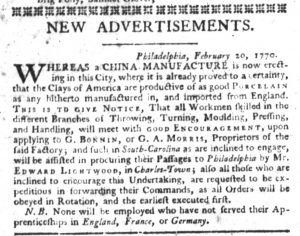What was advertised in a colonial American newspaper 250 years ago this week?

“Sweeping brushes as 19 s. per dozen, and lower by the half or whole gross.”
John Hannah described himself as a “WHOLESALE AND RETAIL BRUSHMAKER” in an advertisement that appeared in the supplement that accompanied the June 15, 1772, edition of the Pennsylvania Packet. Although he stocked “a good assortment of painting brushes” and “a general assortment of bone brushes” that he “imported in the last vessels from England and Holland,” he focused on the items that he produced in his own shop “AT THE HOG, … At the north-east corner of Second and Chestnut Streets” in Philadelphia. A woodcut depicting a boar, the bristles on the crest of its back evident, adorned his advertisement.
Hannah declared that he “made and manufactured” all kinds of brushes “in the best manner” at his shop, assisted by “the best hands in the city.” The quality of his brushes derived from both the materials, “a large and general assortment of Bristles” imported from Europe, and the skills of those who worked in his shop. In addition to quality, Hannah promoted low prices, especially for wholesale transactions. He proclaimed that he “can sell on as reasonable terms as any manufacturer in the province,” challenging prospective customers to compare his prices to those set by his competitors. To demonstrate that he did indeed offer good bargains, he listed some of his prices. Hannah sold a dozen sweeping brushes for nineteen shillings. He offered discounts to buyers who purchased in greater volume. Similarly, he charged four shilling for a dozen “weavers brushes” and “lower by the half or whole gross.” That he did not specify how deeply he discounted such purchases suggested that customers could negotiate the prices.
Hannah incorporated several appeals into his advertisement. He emphasized the quality of his finished product as well as the skills of the workers who labored in his shop. He promoted the range of choices available to customers. He also promised the lowest prices in the colony, listing his prices and offering discounts to retailers and others who purchased large quantities of brushes. To draw attention to his advertisement, he included a woodcut that resembled the sign that marked the location of his shop, a rudimentary form of branding his business.

